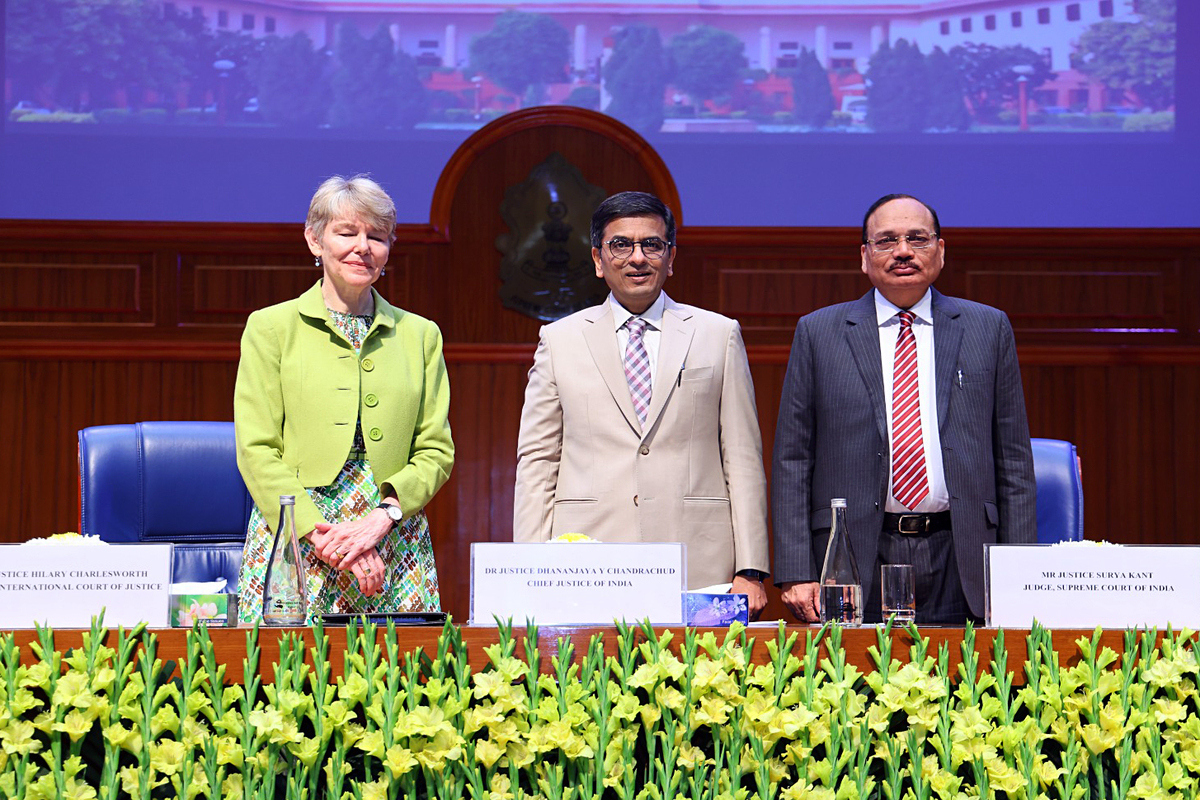Regional languages should also be taken into consideration when teaching law: CJI
The CJI was attending the convocation of Dr Ram Manohar Lohia National Law University here on Saturday.
Justice D Y Chandrachud was speaking at the second annual lecture organised to commemorate the foundation day of the Supreme Court.

New Delhi, Feb 10 (ANI): International Court of Justice, Judge Hilary Charlesworth with Chief Justice of India (CJI) Justice DY Chandrachud and Supreme Court Judge Surya Kant during an event marking the Apex Court's diamond jubilee celebrations, at Supreme Court in New Delhi on Saturday. (ANI Photo)
Chief Justice of India Justice D Y Chandrachud said on Saturday that the women lawyers in the Supreme Court, who were designated as senior advocates, would be the torchbearers of change in the legal profession in our society in the future.
“They (female senior advocates) will be the torchbearers of change in the future of the legal profession in our society,” the chief Justice said, pointing out that before 2024 since its inception, only 12 women lawyers were designated as senior. However, recently there was a significant shift as the Supreme Court designated an equal number of women hailing from various regions across the country as senior advocates.
Chandrachud said this in his address at the second annual lecture organised to commemorate the foundation day of the Supreme Court. This year happens to be the diamond jubilee year of the foundation of the Supreme Court.
Advertisement
“There was once a notion of law which limited us to merely an isolated arena from society. Today, legal fora across the globe are recognising that they cannot view themselves as divorced from the social, political realities and aspirations of the time. This recognition fosters an environment conducive to mutual learning and exchange of ideas,” the CJI said.
In the course of his speech, CJI Chandrachud spoke about his academic journey at Harvard Law School along with International Court of Justice judge Hilary Charlesworth. He said Justice Charlesworth is an esteemed scholar, a pioneering feminist thinker and his old friend.
The CJI said, “…To have more women as judges of the ICJ is not the responsibility of the court alone but the shared responsibility of nation-states and the national groups involved in the nomination process. I dare say the same in the regard of more women in the judicial offices of India as well…”
Chief Justice Chandrachud said in October last year, the ICJ amended, among other documents, its rules of courts and practice directions to make their provisions gender inclusive.
The Supreme Court of India, he said, has also made strides in this regard. It released a sensitisation module for the judiciary on the LGBTQIA+ community, which seeks to sensitize members of the judiciary on the concepts of gender and sexual diversity, on the usage of appropriate terminologies, and make recommendations on the protocol to be followed by courts while interacting with the members of the queer community.
Similarly, he said that the Supreme Court recently released a handbook to combat gender stereotypes in an attempt to ensure that judges use inclusive language and consciously avoid the use of stereotypes in decision making.
International Court of Justice (ICJ) Judge Hilary Charlesworth said assertions on the judge’s independence are always made who are part of international judicial institutions such as the ICJ. She sought to make a distinction between the independence of judiciary and its impartiality.
Almost all disputes and requests that arrive at the court have a clear political context, and some observers are keen to question the court’s ability to resolve such issues on the basis of law, she said.
International Court of Justice judge
Hilary Charlesworth said, “And yet in my view, I think, the court has largely overall managed to adjudicate the legal aspects of politically sensitive disputes with integrity.”
“Judicial independence is critical to the operation of legal institutions, particularly in volatile political contexts such as the international sphere. But its content is not easy to pin down at the international level, where a diversity of judicial backgrounds is vital. Judicial independence the idea of judicial independence must accommodate intellectual, social, cultural and national differences,” ICJ judge Hilary Charlesworth said in her lecture.
Advertisement